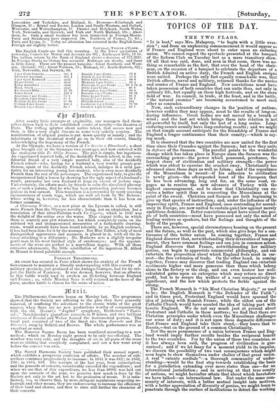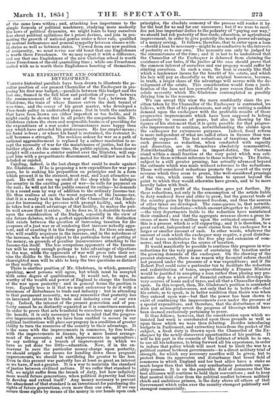TOPICS OF THE DAY.
THE TWO FLAGS.
"IT is best," says Mrs. Malaprop, "to begin with a little aver- sion"; and from an nn pleasing commencement it would appear as if France and England were about to enter upon an enduring union. We cannot regard the spectacle presented at the banquet of the Reform Club on Tuesday last as a mere transitory show. Of all that was said, done, and seen in that room, there was no- thing so remarkable as the fact, that over the head of the chair- man, on the occasion of a banquet to celebrate the departure of a British Admiral on active duty, the French and English ensigns were united. Perhaps the only fact equally remarkable was, that British officers, naval and military, returned thanks for the navies and armies of France and England. New convictions must have taken possession of both countries that can unite thus, not only in ordinary life, but equally on these high festivals, and on the stern field of war. In council, in trade, at the feast, and in the battle, " the natural enemies" are becoming accustomed to meet each other as comrades.
Now, such extraordinary changes in the 'position of nations, however sudden they may appear, must be the results of long-en- during influences. Great bodies are not moved by a breath of wind ; and the last act which brings them into relation is :not all-powerful by itself, but only the last of a long series. Long- enduring causes usually have long-enduring results; and we might on that simple account anticipate for the friendship of France and England a longer continuance than their enmity,—which is say- ing much.
It is observed that the two countries are now united for the first time since their Crusades against the Saracen; but now they unite in defence of the Saracen. The parallel points to the wonderful change which has taken place in Europe since the Saracen was the encroaching power—the power which possessed, perchance, the largest share of civilization and military strength—the power which was ablest to exercise the cruelest sway. Christianity has advanced since those days as well as Islam ; and if the repentance of the Mussulman is recent—if his adhesion to civilization is newly given—the oft-repeated boast of the European that he has been advancing, long and far, on the same road, en- gages us to receive the new advances of Turkey with the highest encouragement, and to show that Christianity can ex- ercise a better spirit than in converting the Mussulman at the point of the sword. Christian and Saracen are both beginning to give up that species of instruction ; and, under the influence of the improving spirit, France and England, once contending for ascend- ancy in Europe, are now united to sustain quiet law against merely ambitious dominion. Better convictions must have seized the peo- ple of both countries—must have possessed not only the mind of leading writers or speakers, but the feelings and thoughts of the body of the people.
There are, however, special circumstances bearing on the present and the future, as well as the past, which also give hope for a con- tinuance of this better union. In coming together, France and England discover that, notwithstanding their diversities of temper- ament, they have common feelings and can join in common action. England discovers that France, notwithstanding her military genius, can begin to appreciate commercial philosophy, and can entertain the proposition about which England feels most in ear- nest—the free extension of trade. On the other hand, in coming together, France may discover that trading England can entertain sentiments higher and more generous than those which belong alone to the factory or the shop, and can even bestow her well- calculated gains upon an enterprise which may return no direct profit, but is to secure the welfare of a race comparatively in- significant, and the law which protects the feeble against the strong.
The French Monarch is "his Most Christian Majesty," or used to be ; the English Monarch is "the Defender of the Faith "; and in times past, Protestant England would have spurned the idea of joining with Romish France, while the eldest son of the Catholic Church would have scouted the idea of taking part with heretic England. We do not say much just at present about Protestant and Catholic in these matters ; we find that there are Christian principles under which even the Mussulman challenges our sense of duty ; and it is not upon these dogmatic differences that France and England take their stand,—they leave that to Russia' but on the ground of a common Christianity. But the mere permanence of a union between France and Eng- land would imply further results besides the reciprocal benefit to the two countries. For by the union of those two countries, as it has alwa3 s been said, the progress of civilization is gua- ranteed; and if we let fancy for a moment yield Wits impulse, we discern the possibility of two vast consequences which might soon begin to show themselves under shelter of that great union. A real " entente cordiale "—a thorough community of under- standing—would be the first step towards establishing the basis for a jurisdiction extending over more states than one—for an international jurisdiction ; and in arriving at that true comity of nations, we might hereafter attain that about which heretofore we have talked—an international law. But under the same com- munity of interests, with a better mutual insight into motives, with a better appreciation of diversity of genius, we might learn to penetrate through the surface of institutions to detect the working of the same laws within ; and, attaching less importance to the simple formula of political machinery, studying more modestly the laws of political dynamics, we might learn to busy ourselves less about political agitations for a priori devices, and join in pro- moting the growth of national genius under a freer rule, qualified by mutual forbearance and general sympathy between classes with- in states as well as between states. Viewed from our new position of reciprocity, we must revise our old boast that one Englishman is worth three Frenchmen. Or we may repeat it with a difference, and say that one Englishman of the new Christian school is worth three Frenchmen of the old quarrelling time ; while one Frenchman united with us is worth three Englishmen boasting of themselves.



























 Previous page
Previous page